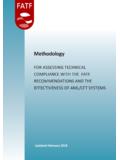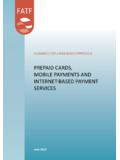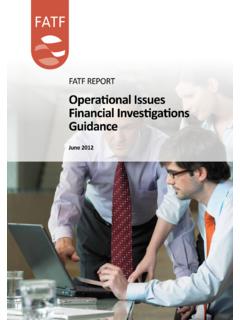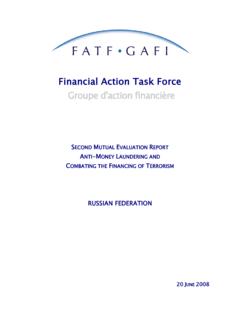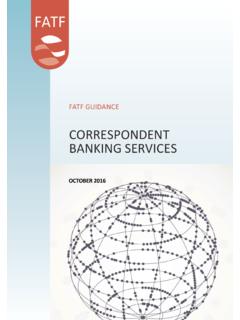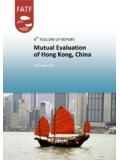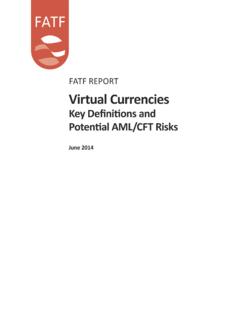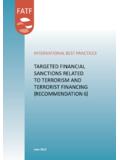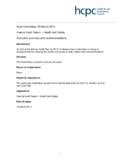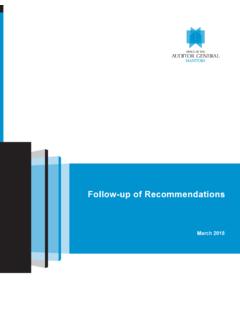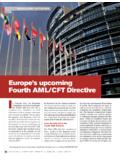Transcription of THE FORTY RECOMMENDATIONS OF THE FINANCIAL …
1 THE FORTY RECOMMENDATIONS OF THEFINANCIAL ACTION TASK FORCE ON MONEY FRAMEWORK OF THE RECOMMENDATIONS 1. Each country should, without further delay, take steps to fully implement the Vienna Convention,and proceed to ratify it. 2. FINANCIAL institution secrecy laws should be conceived so as not to inhibit implementation of therecommendations of this group. 3. An effective money laundering enforcement program should include increased multilateralcooperation and mutual legal assistance in money laundering investigations and prosecutions andextradition in money laundering cases, where OF NATIONAL LEGAL SYSTEMS TOCOMBAT MONEY LAUNDERINGD efinition of the Criminal Offense of Money Laundering 4. Each country should take such measures as may be necessary, including legislative ones, toenable it to criminalize drug money laundering as set forth in the Vienna Convention.
2 5. Each country should consider extending the offense of drug money laundering to any othercrimes for which there is a link to narcotics; an alternative approach is to criminalize moneylaundering based on all serious offenses, and/or on all offenses that generate a significant amountof proceeds, or on certain serious offenses. 6. As provided in the Vienna Convention, the offense of money laundering should apply at least toknowing money laundering activity, including the concept that knowledge may be inferred fromobjective factual circumstances. 7. Where possible, corporations themselves - not only their employees - should be subject tocriminal liability. Provisional Measures and Confiscation 8. Countries should adopt measures similar to those set forth in the Vienna Convention, as may benecessary, including legislative ones, to enable their competent authorities to confiscate propertylaundered, proceeds from, instrumentalities used in or intended for use in the commission of anymoney laundering offense, or property of corresponding value.
3 Such measures should include the authority to : 1) identify, trace and evaluate property which issubject to confiscation; 2) carry out provisional measures, such as freezing and seizing, toprevent any dealing, transfer or disposal of such property; and 3) take any appropriateinvestigative addition to confiscation and criminal sanctions, countries also should consider monetary andcivil penalties, and/or proceedings including civil proceedings, to void contracts entered byparties, where parties knew or should have known that as a result of the contract, the State wouldbe prejudiced in its ability to recover FINANCIAL claims, through confiscation or collection offines and OF THE ROLE OF THE FINANCIAL SYSTEMS cope of the Following RECOMMENDATIONS 9. RECOMMENDATIONS 12 to 29 of this paper should apply not only to banks, but also to non-bankfinancial institutions.
4 10. The appropriate national authorities should take steps to ensure that these RECOMMENDATIONS areimplemented on as broad a front as is practically possible. 11. A working group should further examine the possibility of establishing a common minimal list ofnon-bank FINANCIAL institutions and other professions dealing with cash subject to theseRecommendations. Customer Identification and Record-keeping Rules12. FINANCIAL institutions should not keep anonymous accounts or accounts in obviously fictitiousnames: they should be required (by law, by regulations, by agreements between supervisoryauthorities and FINANCIAL institutions or by self-regulatory agreements among financialinstitutions) to identify, on the basis of an official or other reliable identifying document, andrecord the identity of their clients, either occasional or usual, when establishing business relationsor conducting transactions (in particular opening of accounts or passbooks, entering intofiduciary transactions, renting of safe deposit boxes, performing large cash transactions).
5 13. FINANCIAL institutions should take reasonable measures to obtain information about the trueidentity of the persons on whose behalf an account is opened or a transaction conducted if thereare any doubts as to whether these clients or customers are not acting on their own behalf, inparticular, in the case of domiciliary companies ( institutions, corporations, foundations,trusts, etc. that do not conduct any commercial or manufacturing business or any other form ofcommercial operation in the country where their registered office is located). 14. FINANCIAL institutions should maintain, for at least five years, all necessary records ontransactions, both domestic or international, to enable them to comply swiftly with informationrequests from the competent authorities. Such records must be sufficient to permitreconstruction of individual transactions (including the amounts and types of currency involved ifany) so as to provide, if necessary, evidence for prosecution of criminal behaviour.
6 FINANCIAL institutions should keep records on customer identification ( copies or records ofofficial identification documents like passports, identity cards, driving licenses or similardocuments), account files and business correspondence for at least five years after the account documents should be available to domestic competent authorities in the context of relevantcriminal prosecutions and Diligence of FINANCIAL Institutions15. FINANCIAL institutions should pay special attention to all complex, unusual large transactions, andall unusual patterns of transactions, which have no apparent economic or visible lawful purpose. The background and purpose of such transactions should, as far as possible, be examined, thefindings established in writing, and be available to help supervisors, auditors and lawenforcement 16.
7 If FINANCIAL institutions suspect that funds stem from a criminal activity, they should be permittedor required to report promptly their suspicions to the competent authorities. Accordingly, thereshould be legal provisions to protect FINANCIAL institutions and their employees from criminal orcivil liability for breach of any restriction on disclosure of information imposed by contract or byany legislative, regulatory or administrative provision, if they report in good faith, in disclosingsuspected criminal activity to the competent authorities, even if they did not know precisely whatthe underlying criminal activity was, and regardless of whether illegal activity actually occurred. 17. FINANCIAL institutions, their directors and employees, should not, or, where appropriate, shouldnot be allowed to, warn their customers when information relating to them is being reported tothe competent authorities.
8 18. In the case of a mandatory reporting system, or in the case of a voluntary reporting system whereappropriate, FINANCIAL institutions reporting their suspicions should comply with instructions fromthe competent authorities. 19. When a FINANCIAL institution develops suspicions about the operations of a customer, and when noobligation of reporting these suspicious exists, makes no report to the competent authorities, itshould deny assistance to this customer, sever relations with him and close his accounts. 20. FINANCIAL institutions should develop programs against money laundering. These programsshould include, as a minimum :(a)the development of internal policies, procedures and controls, including the designation ofcompliance officers at management level, and adequate screening procedures to ensure highstandards when hiring employees;(b)an ongoing employee training programme;(c)an audit function to test the to Cope with the Problem of Countries with No or Insufficient Anti-MoneyLaundering Measures21.
9 FINANCIAL institutions should give special attention to business relations and transactions withpersons, including companies and FINANCIAL institutions, from countries which do not orinsufficiently apply these RECOMMENDATIONS . Whenever these transactions have no apparenteconomic or visible lawful purpose, their background and purpose should, as far as possible, beexamined, the findings established in writing, and be available to help supervisors, auditors andlaw enforcement agencies. 22. FINANCIAL institutions should ensure that the principles mentioned above are also applied tobranches and majority owned subsidiaries located abroad, especially in countries which do notor insufficiently apply these RECOMMENDATIONS , to the extent that local applicable laws andregulations permit.
10 When local applicable laws and regulations prohibit this implementation,competent authorities in the country of the mother institution should be informed by the financialinstitutions that they cannot apply these Measures to Avoid Currency Laundering23. The feasibility of measures to detect or monitor cash at the border should be studied, subject tostrict safeguards to ensure proper use of information and without impeding in any way thefreedom of capital Countries should consider the feasibility and utility of a system where banks and other financialinstitutions and intermediaries would report all domestic and international currency transactionsabove a fixed amount, to a national central agency with a computerised data base, available tocompetent authorities for use in money laundering cases, subject to strict safeguards to ensureproper use of the information.
